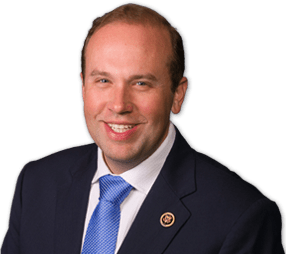Press Releases
Congressman Jason Smith: New Proposed EPA Rule is War On Rural AmericaToday, Congressman Jason Smith (R-Salem, MO) was appalled by the president’s new draft EPA rule which would tighten National Ambient Air Quality Standards (NAAQS) for ground-level ozone from the current 75 parts per billion to between 65 and 70 parts per billion and threaten jobs. The EPA is even taking comments on possibly reducing the level to 60 parts per billion. This is yet another EPA overreach that is being undertaken despite congressional opposition. “This catastrophic EPA regulation is another example of the war on rural America, threatening good-paying manufacturing jobs in my district and across the country.” said Congressman Smith. “Three years ago the president delayed changing ozone regulations because it would hurt businesses, but now that the president doesn’t have another election, he doesn’t seem to care how businesses or rural America will fare.” Three years ago President Obama delayed a change in the regulation citing ‘the importance of reducing regulatory burdens and regulatory uncertainty,’ and when the EPA considered tightening the same air standards in 2010, the estimated costs in Missouri were $1.9 billion per year. “Everywhere I travel in the district I continue to hear about how the EPA is harming individuals and getting in the way of economic growth and job creation,” continued Congressman Smith. “The Center for Regulatory Solutions is calling this the most expensive regulation in U.S. history – when combined with the coal power plant rules and the “Waters of the United States” rule, the burdens placed on our businesses are going to shut folks down. Regulating business out of existence is not the way to turn this economy around.” Congressman Smith has long been vocal about how detrimental this would be to the area, hosting round tables and community meetings throughout the district with co-ops, municipal utility boards, civic leaders, business owners, and manufacturers. They’ve said in no uncertain terms that this rule will force them to lay off employees. The Southeast Missouri Regional Planning and Economic Development Commission, which runs air quality monitoring stations in Bonne Terre and Farrar, Missouri, has said the area would not be able to meet those levels. According to recent studies, all 30 counties in our 8th Congressional District are likely to be out of compliance with a 60 parts per billion restriction. This includes the national forest land and national parks. In Missouri, over 80% of the state’s electricity is created by coal-fired power plants making electricity much more affordable, and reliable. This is the primary reason Missouri is a leading manufacturing state. Rules like the EPA's proposed changes to NAAQS have the potential to take away Missouri's manufacturing advantages, and cost our state, and our district, jobs. Ground-Level Ozone Background: Ground-level ozone is formed from the combustion of fuel from cars, power plants and other industrial plants. It can also be formed from non-manmade sources like plants, forest fires and ozone from the stratosphere migration to ground level. Ground-level ozone naturally increases in the summer. ### |


